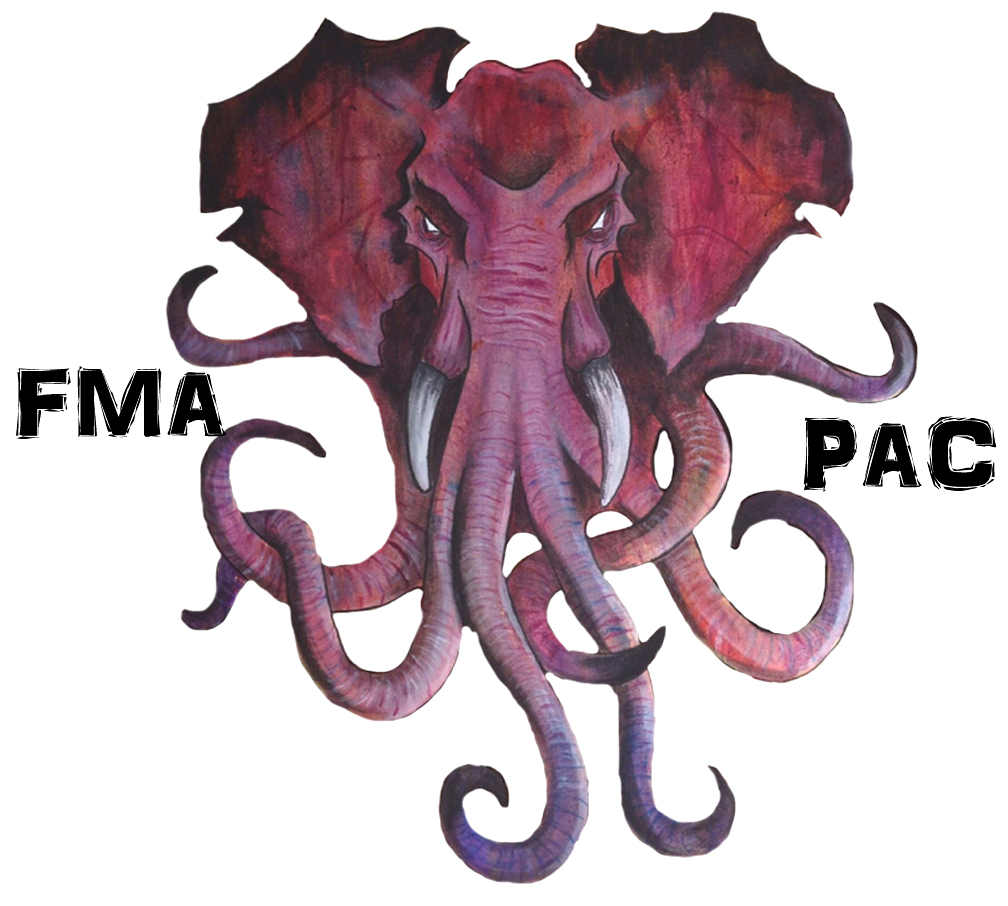



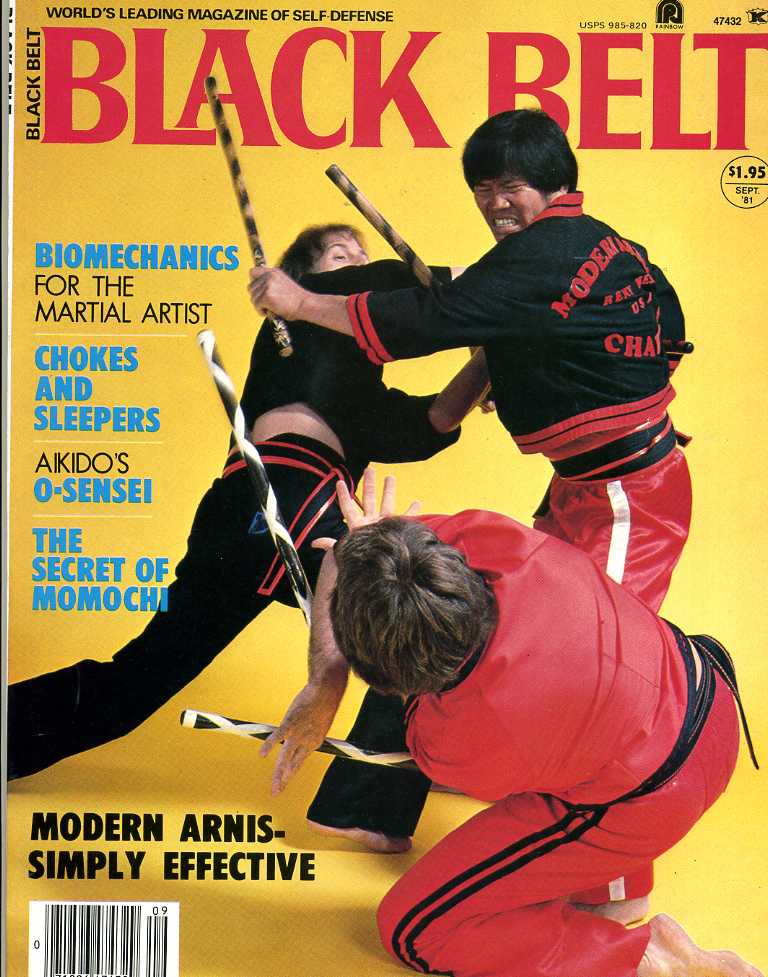
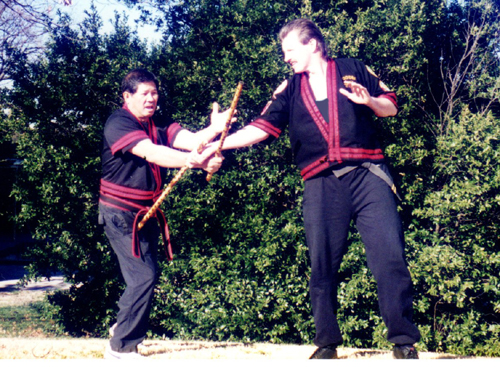
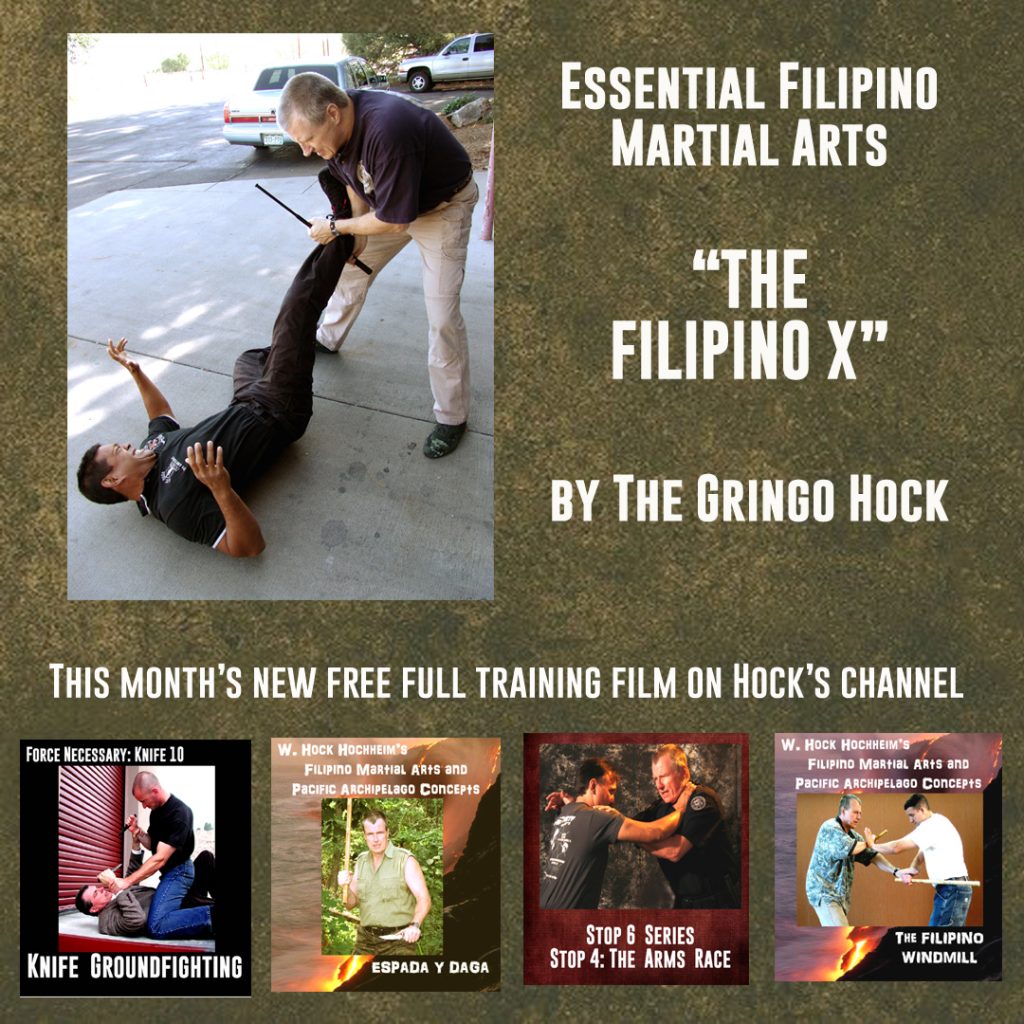
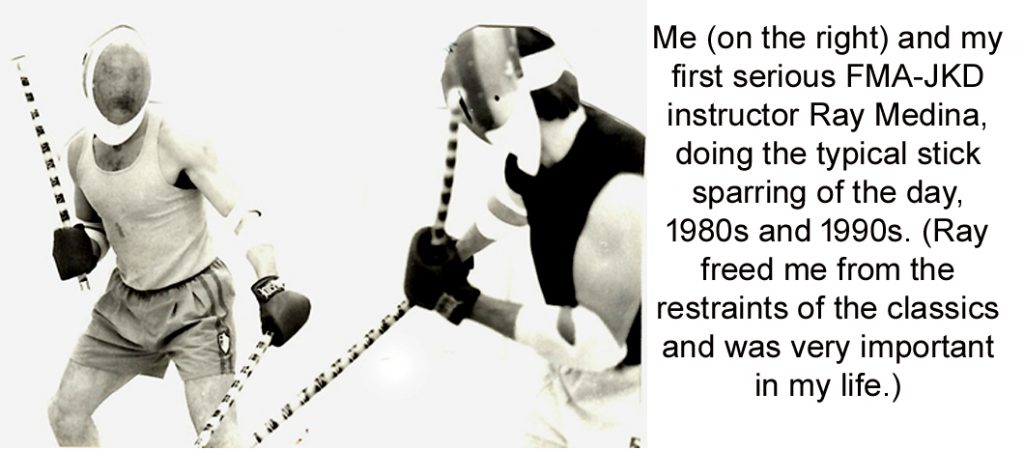 Respect the Head Shot? Do you? Really? One of the conundrums in FMA stick sparring is figuring out the realistic importance of the head shot and emphasizing it in a training doctrine. Ignoring the strike (as in “pretending” it didn’t happen and “sparring-on”) because you have a helmet on is training doctrine mistake. Making it “count” in a helmeted world is important and should be a mandatory training doctrine mission.
Respect the Head Shot? Do you? Really? One of the conundrums in FMA stick sparring is figuring out the realistic importance of the head shot and emphasizing it in a training doctrine. Ignoring the strike (as in “pretending” it didn’t happen and “sparring-on”) because you have a helmet on is training doctrine mistake. Making it “count” in a helmeted world is important and should be a mandatory training doctrine mission.

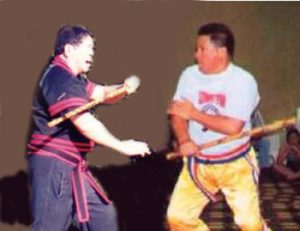
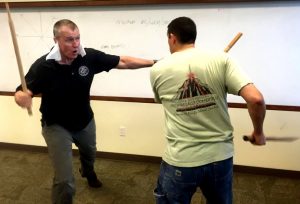
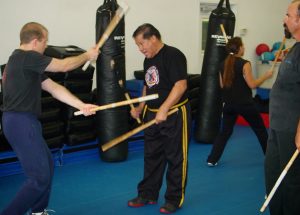
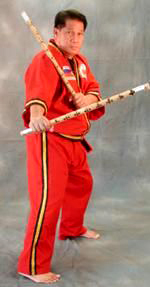
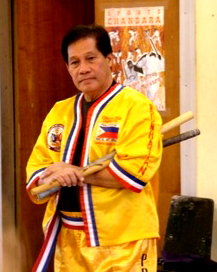
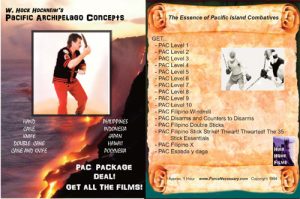
I was thinking about the classic park in Manila. “Rizal Park, also known as Luneta Park or simply Luneta, is a historical urban park in the Philippines. Formerly known as Bagumbayan in the era of colonialism under the Spaniards.”
For many a decade if you trained in Manila, the Philippines, a must go-to place is this park. Many, many famous people have taught and gathered here. And when we were in Manila, we were either at the Presas school, this park or at the college where Ernesto taught Arnis at those times.
It did bother Ernesto a bit at times at the park, because various FMA grandmasters would set up folding chairs and watch us. He would whisper, “You see dese guys? Dey are grandmasters. Dey are spying on me.”
This above photo is me and Shelley. Early 90s. There were only like 6 of us there, so it was pretty intense. Under his scrutiny all the time. We would go about 4 hours in the morning and about 3 1/2 hours in, there would be a break. Ernesto would say, “Take a break, then…examination time.”
This photo – Since we were so few, we also had his black belts as partners too, who were very helpful too. With Renato “Boks” Centro.
“Examination time?” we’d say in the beginning days. He was always “testing” us, but this would be a more real test for the last part of 3-4 hours. So…there was no break. We would walk off behind some trees or bushes and work through those ten minutes to hurry-review what we did. Then some water.
Then…the
“Come on, COME ON!”
“Speed motion!”
…observation “test.
Then lunch. Then another 4 hours. 6 days on. 1 day off pace.
That top photo again. Me, Shelley Millspaugh and the big man GM watching us. Captain Rene, a Honduran fighter pilot is behind us. Shelley Millspaugh added: “Great memories. That first camp was as intense as you could’ve made it. I haven’t had that type of intensity since. GGM was the Energizer bunny. Never stops.”
++++++++++++++++++++++++
Hock’s email is HockHochheim@ForceNecessary.com
Remy Presas frequently told this story in seminars. Many of us have heard this “leff story.”
After witnessing several bolo (machete fights) which I chronicled earlier on the Presas Group Page) , and after the somewhat underground “sport” of bolo fights began to disappear from deaths and maimings, rounded sticks replaced the bolos in fighting for money. (Not sticks shaped liked swords but rounded ones – something else I wrote about on the Presas page.) Remy fought these fights for money in boxing rings, cockfight arenas and wherever betting groups might gather. He told us that after a while, numerous people approached him to teach them and their sons how to stick fight.
“But I am leff,” he told them. Left-handed. “And dey were right.” He said he could not teach them. They pushed the requests.
“But de money became so good…I become right.” He started to teach them the stick with his right hand. Much of it was longer range stick dueling (“of course, you could just hit de man in de head with a stick.” – he would often say, when discussing complicated moves.)
And as Remy has said often, the double sticks help teach the “other side” anyway.
In short, really short – lefty versus righty has always been a big thing in sports. The southpaw boxer. The lefty pitcher versus the righty hitter in baseball. Lefties are 1 in 10 people. This is an advantage for them simply because most sports folks and fighters have built up a “versus righty” repertoire, a library in their head, even like in their “subconscious” of what tiny steps and moves a righty does to hit, kick and position them. The most subtle increments are stored in the brain. We use them as tip-offs. We see less of these reps from a lefty, as there are less lefties.
“I become right. I become good.”
And he made a lot of money teaching righties. But still fighting too. (and he had a few jobs too. Working at a family shipyard and…not known by many, a barber.)
He would say in seminars about the money stick fights…
“Round one, I am right.
– Ding.
Round two, I am right.
– Ding.
Round three…I am leff. I win!”
His eyebrows would raise. We all would laugh. We got it.
Remy became as ambidextrous as possible. In close quarters, he could switch hands effortlessly and really foul up your brains. He taught this inside the newer tapi tapi. He taught this on the single stick versus double stick drills, as you must go single stick right and left-handed versus the double sticks. (Ernesto did this too.) These were Presas “leff” priorities which I can’t say I found “up front” in many other FMA systems.
(I remember one Inosanto seminar many, many years ago in Irving, Texas where, for about 2 or 3 hours on a Sunday, we did left-hand sumbrada. It freaked all the experts out. We became bumbling idiots)
“You must do boff leff and right!” – Remy Presas
+++++++++++
Hock’s email is HockHochheim@forcenecessary.com
Join this Facebook Presas memory page, click here
“It’s a Brother Thing?”
There was and is always a lot of talk about the various feuds between Remy and Ernesto through the years. How friendly were they? Could they work together? We have covered some of these stories on the Facebook Presas Tribute page, But, I can write about what I think was one of their last interactions. A final phone call?
In the 1990’s Remy married Canada’s Yvette Wong. She was a terrific girl and a Tai Chi instructor who had a Tai Chi video distributed by Walmart. Many of us met her in the 1990s and we all were very impressed with her. I know I was. Soon he had kids with her! (I can still picture Remy pushing a baby carriage.)
Then…then…disturbing…he suddenly picked up with a Dallas area woman that was, frankly…a mere shadow of a woman compared to Yvette. WHAT? We all asked ourselves. HER!? Really? And he wound up living at her house very near to where I lived. Near the DFW airport. We all felt sad for Yvette and the kids up in Vancouver. I had Remy’s new phone number with this Dallas girl, and while it was nice to have him nearby, but jeez you know? Yvette!
Ernesto came through the USA. It was about…1998? And once again stayed with me for a while for our seminar as well as passing through to some of the others. On this trip he mentioned Remy a few times and how much he missed him and wished he could talk with him. Ernesto was really a “true-blue” family/loyalty kind of guy. Well, hell…I had Remy’s local phone number and he wasn’t that far way. I told Ernesto-
“I have his number. He lives now in the next city from here.” (they might even…meet?)
He wanted to talk to him. Hmmm, this is tricky for me to be in the middle of this. But, I got the number out and dialed it. I got Remy on the phone. Ernesto stood looking out the balcony. Nervous. Waiting.
“Remy…hello…yes…hey, I have Ernesto here in my apartment. He says, he says he really wants to talk to you.”
“Ern…esto?” Remy said.
“Yes.”
“Ahhh, is something wrong?”
“No. He just wants to talk with you.”
“Ahhh, okay.”
Whew! I handed Ernesto the phone and he sat at my kitchen table and they talked. I tried to make myself busy around the apartment. From what I could hear from Ernesto’s part, it was going very, VERY well. I was feeling good about this. This call lasted about 20 to 25 minutes, during which Ernesto told Remy that he was his brother and he loved him. The phone call started winding down. It was going so, so well!
Then…then…Ernesto asked.
“Can you…can you helpa me, become more pamous?”
Crap. I knew instantly that was not good. This was not what Remy wanted to hear. And from Ernesto’s face, I knew that asking that question was a mistake. Remy immediately got mad. It almost seemed like that request was the real secret reason for wanting to talk with him. Which it wasn’t. I guess the conversation was going so well, Ernesto just asked. The decades old, sort of rivalry they had reared up again. The whole, younger brother vs older brother thing, doing the same business thing.
Ernesto hung up after that request and shook his head. I don’t know what Remy said but it was not good.
“It was good to talk to him.” Ernesto said. “But, he becomes mad at me at the end.”
Yeah. You have to think that Remy spent his whole life slowly developing contacts and having seminars and working, working, working to establish this…list. The hard way. The “original” way. A path-blazing way. Very few people were doing seminars back then. He and just a few others kind of “invented” the path. And to…to give it away or give a portion away, is very difficult.
Many of us use to think how cool it would have been to have at least one big, Presas Brothers weekend seminar. If I were involved, I could have organized it in Kansas City, center of the country for all to get to. But it would and could never happen. I do believe if Ernesto had not asked that final question, while things would have been so friendly and so fine, and a good memory of what I think was maybe their last conversation (?) Remy still would NOT actively help him or do something with him like a seminar.
In the end I don’t think that Ernesto needed the help anyway. He was doing fine. What would a Remy and Ernesto seminar be like? Look like? Would Ernesto people like to delve so deeply into Tapi-Tapi? Would Remy people like to get back into longer-range, head-banging? Would something happen, or be said and the two would stop talking? It’s just a….a macho brother-thing of two macho brothers trying to do the macho “seminar” thing.
+++++++++++++++++++++
Hock’s Email is HockHochheim@ForceNecessary.com
Join the Presas Tribute page , Click here
When was this? This big, “Filipino martial arts turning point” for me? Keep in mind, this is just me and my personal view on things. Don’t hate me cuz I’m viewtiful!
I started doing FMA in 1986, in among other arts like JKD, and had been doing the classic karate and jujitsu (not the Brazilian wrestling version of today). By about 1993 I had covered a lot of FMA material, been to the Philippines twice. Got black belts from both Ernesto Presas and Remy Presas.
The big turning point came with double sticks, of all odd, obscure things. In 1993, a friend called me and said, “Hey Hock, this weekend, Guro ______ is coming into Dallas! He is going to do two full days of the ______ double stick drills. Are you coming?”
Two full days of…double sticks? I guess this phone call had an epiphany moment for me when several ideas flashed through my head. I found myself confessing…
“Two days? Double sticks? Well, I think I’ll pass. I mean, how many double stick drills are there anyway?”
“You’re gonna miss it! A chance to learn THEE _______ double stick drills!”
When we hung up, I examined my epiphany moment. Well, from the Inosanto world, the Remy Presas world, and Ernesto Presas world, I’d already collected about 50 double stick drills according to my anal retentive lists I keep. FIFTY ! I suddenly asked myself,
How ARE they the same? I realized that it was more important to organize the drills, not from the hero-worship-“who” or the hero worship-“what” fan club systems, but instead how are the drills all the same? (It is counter productive and stifling to worship system-heads and systems.)
How are they so similar. And how and why am I wasting my time collecting endless double stick drills from a nearly endless group of known and unknown system-heads who all think theirs are ever-so-special. Many of which are so much the same and with only one slight different tweak here or there. Rather, smarter, I should instead try to understand the essence of all of them. The essential core. Then, teach the universal core.
I was already contemplating the differences between the Remy and Ernesto double stick programs. Remy seemed to have 5 or 6 basic patterns with variations. Ernesto had the classic “must know” list.
Then…then I asked myself why I didn’t view ALL aspects of the varied FMAs the same way? Why not find the universal core of FMA itself? Find the very of essence…
…in this clean, kind of scientific manner? Study these cores first. Deal with the needed and dismiss the probably unneeded and-or redundant and-or prissy variables.
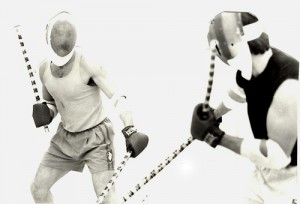
There will always be happy museum and happy history collectors, who collect ANYTHING from ANYBODY. And then those who like to sort-of, name-drop stuff like – “at this point, Roohan moved his kneecap this way, while Roohan kept his meniscus right here…” I can talk some of that artsy smack too, just from training years osmosis. I can delight the esoteric fanatics with these tidbits of meniscus positioning. I can also tell you that Ed Kranepool played first base for the Mets in the 1960s. Hey! I do know stuff! But how useful is it?)
Annnnd with that idea? I started constructing the generic PAC course. Pacific Archipelago Concepts, an irreverent, skeptical look at the related core of those related arts. This includes all the big systems in the Pacific Ocean. A lot of this work had been done, like with Kajukenbo (karate, jujitsu, kenpo, boxing).
This clean, generic, non-worship approach did not make me popular with some existing FMA entities, (some are cult-like) in fact I was suddenly shunned by some. And in the seminar business, it is still not my most popular or even my favorite course to teach, as I usually cover generic “combatives” for lack of a better term. But hey, FMA is fun to do, good exercise, a hobby with numerous abstract mental and physical benefits. And when asked to, I will happily cover it. I feel like if I can spread the core-foundation. Then anyone can more quickly blend into any FMA system they wish to pursue.
(By the way, I carried this “core” perspective over to combatives. In a way, this “double stick epiphany” in 1993 was an important idea in more ways than one. It gave me a mission. A purpose. A vision if you will. My pursuit, my study, my interest, my goal, is the universal generic.)
Back to 1993! I later asked that friend back in 1993,
“How was the _______ double stick seminar?”
“It was great!” he said, “We did 30 drills. Most of them we already do, others just a little different here and there.”
Already do? Imagine that!
********
Hock’s email is hock@hockscqc.com
Get the full info on the PAC-FMA course right here, click here